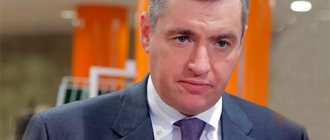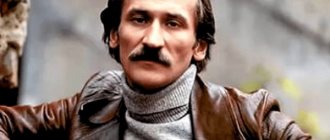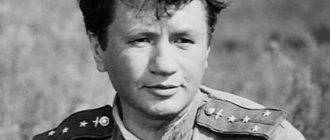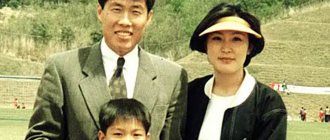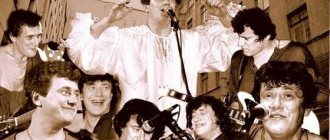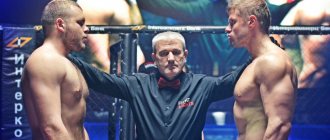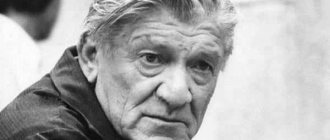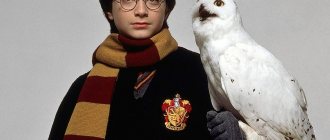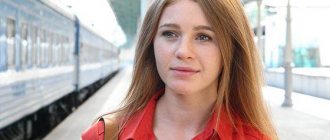Nikolai Parfenov: biography
Nikolai Ivanovich Parfenov is an actor remembered by cinema lovers. The track record of this charming and charismatic man includes more than a hundred cinematic works, where Parfenov played mainly episodic roles.
Actor Nikolai Parfenov
Video course “Spring”
Landscaping for busy people, a beautiful garden without the hassle
A training course for those who want to make their dacha beautiful and prefer to spend their time, effort and money wisely.
Special offer! 50% discount! Make good use of your self-isolation!
₽ 1200.00 ₽ 600.00
MORE ❯❯❯
Nikolai Ivanovich was given to ordinary Soviet people with a bang. He played an engineer, a policeman, a peasant, a bus driver - those people who could easily be met on the street. Despite his fleeting appearances in films, Parfenov made viewers remember his characters and think about their fate. The actor played in such films as “The Devil with the Briefcase”, “Where is Nophelet?”, “Come to me, Mukhtar!” and other famous films by great directors.
Biography
Nikolai Ivanovich Parfenov is an actor remembered by cinema lovers. The track record of this charming and charismatic man includes more than a hundred cinematic works, where Parfenov played mainly episodic roles.
Actor Nikolai Parfenov
Nikolai Ivanovich was given to ordinary Soviet people with a bang. He played an engineer, a policeman, a peasant, a bus driver - those people who could easily be met on the street. Despite his fleeting appearances in films, Parfenov made viewers remember his characters and think about their fate. The actor played in such films as “The Devil with the Briefcase”, “Where is Nophelet?”, “Come to me, Mukhtar!” and other famous films by great directors.
Childhood and youth
Nikolai Ivanovich was born on July 26, 1912 in the village of Sergiev-Gorki, which is located in the Vladimir region. He grew up and was brought up in a large family, together with his brothers and sisters.
The Parfenov family was considered wealthy by the standards of that time, since Nikolai’s father managed to make it from an ordinary peasant to an assistant on a ship plying the Volga. While the head of the family was earning money, the actor’s mother stayed at home, running the household and taking care of the children.
Nikolay Parfenov
In the fall of 1917, a troubled and unstable time began for Russia, associated with political upheavals. The October Revolution also affected the Parfenovs, but after their victory, their father was appointed director of the flax mill.
But soon a misfortune occurred in the house - the head of the family unexpectedly died. Therefore, all worries fell on the fragile shoulders of the children: at the time of the death of the main breadwinner, the eldest child was 14 years old, and Nikolai turned seven.
Nikolai Parfenov in his youth
It is worth saying that the Parfenov family always lived in harmony and was guided by the motto “One for all and all for one.” Even the tragedy did not force them to give up. The children helped their mother, discouraged by grief, as best they could: they chopped wood, cut hay, and looked after the cattle. Even the old grandfather tried to help with the housework.
Thanks to optimism and work, the Parfenovs rose to their feet, but a new disaster occurred. In the 1930s, dispossession began. At a village meeting, where they demanded to point out wealthy peasants, envious neighbors chose the most hardworking fellow villagers.
Nikolay Parfenov
Therefore, it is not surprising that the Parfenov family was “disbanded.” The mother was sent to the North, where she was engaged in the development of peat bogs, and the children went to relatives, some to Perm, and others to the capital.
In Moscow, Parfenov’s brothers and sisters found their calling, and Nikolai Ivanovich himself firmly decided to become an actor and enroll in a theater school. True, before submitting the documents, the young man worked as a fitter at. However, Nikolai was no stranger to work.
Nikolay Parfyonov
Honored Artist of the Russian Socialist Republic Nikolai Parfenov came into this world on July 26, 1912 in the village of Sergeevy Gorki, which is located in the Vladimir province. His family was initially quite prosperous, but fell under a wave of dispossession, and then hard times began. Nikolai went to work at an early age, first as an ordinary helper, then he was promoted. Being a cheerful and unusually charismatic young man, he liked to make people laugh, liked their attention, so Parfyonov decides to enroll in the acting department at the Massovet.
In 1935, when his studies ended, Nikolai was accepted into service at the Academic Theater under the Mossovet, in Moscow. The actor performed on this theater stage for 54 years, played many roles, the audience cried and laughed under his lines, and each performance was invariably accompanied by applause. The roles that the public most remembered were Nikolai Parfenov's roles as Alexander Kochetkov in the play Nadezhda Durova, directed by Yu. Zavadsky, Taras Overya in the production of N. Vinnikov - The Cup of Joy, Nekrasov in the play They Fought for the Motherland, directed by M. Sholokhov, Morozka in the play Destruction, directed by A. Fadeev.
In addition, the artist participated in audio recordings of radio plays, which were extremely popular in the 50-60s of the last century. It is also worth noting that Parfyonov simultaneously acted in cinema; his filmography includes more than 130 films. Nikolai starred in melodramas and comedies, which are quite suitable for family viewing, his characters are always deep and at the same time easy to understand, so it’s a pleasure to watch the performance of this great artist. According to film critics, the most popular films with Nikolai Parfenov were: To Me Mukhtar - 1964, True Friends - 1954, The Chairman - 1964, Children of Don Quixote - 1965, The Brothers Karamazov - 1968, Tears Were Dripping - 1982 , Let's not focus - 1992 and many others.
The actor stopped acting in films since 1993, and his life was cut short at the age of 86, on January 7, 1999. The ashes of Nikolai Parfenov were buried in Khimki, Moscow.
Nikolai Parfenov has brown eyes, naturally dark hair color, fair skin and medium lips. The face shape is oval, the forehead is high, the hair is straight and soft. Nikolai Parfyonov did not change his hair color, preferring natural. The actor has a large straight nose and a pointed chin. Nikolai Parfenov sometimes grew a mustache and beard. The actor's height is 182 cm, no tattoos.
Zodiac sign - Leo (08/26/1912)
Theater
Not all of the actor’s brothers became students the first time, but Nikolai Ivanovich can be called lucky. The young man submitted documents to the studio at the Moscow Theater. Mossovet and was accepted immediately. It is noteworthy that the selection committee gave the guy the following description: “Funny and uncouth.” The teachers recognized in the eccentric and sincere Nikolai a talent that was useful on the comedy stage.
Nikolai Parfenov as Mitrofanushka
After graduating from the educational institution, Parfenov was accepted into the theater troupe, in which he worked most of his life, playing roles in famous productions of works by great writers. For example, in the play “The Minor” based on Denis Fonvizin, Nikolai Ivanovich played the main role of the ignorant Mitrofanushka
. The actor also participated in Lermontov’s “Masquerade,” Dostoevsky’s “The Brothers Karamazov” and other productions.
Difficulties on the personal front
The famous actor managed to arrange his personal life not the first time. While a student, he married Olga Vasilyeva, but the marriage lasted only a few years. In this family union, the actor had his only child, daughter Ira.
For the second time, Nikolai married a Mossovet employee named Larisa. This strong marriage lasted for 47 long years, until the actor’s death. The couple never had any children together.
Nikolai Parfenov passed away on January 7, 1999. The actor was 87 years old! He lived a long and eventful life, leaving behind a bright mark on Russian cinema.
Let us remind you that Mick Jagger, vocalist of The Rolling Stones, celebrates his birthday on the same day as Soviet actor Nikolai Parfenov.
Movies
Nikolai's first appearance in front of the director's cameras took place in 1944, which marked the start of his filmography. Parfenov starred in the film “Native Fields,” where he played the role of the new chairman of a collective farm. The actor's name was not indicated in the credits, which did not stop directors from inviting him to their films.
Nikolai Parfenov in the film “Come to me, Mukhtar!”
Nikolai Ivanovich has never played heroic lovers or protagonists who face troubles or problems along the path of life. But his fleeting appearances in films were the icing on the cake of Soviet cinema. It is perhaps difficult to imagine the film “Come to me, Mukhtar!” (1964) without conductor Gubarev or the film “Beware of the Car” (1966), where there would be no prosecutor at the court hearing.
In 1975, Nikolai Ivanovich was awarded a role in the film “Afonya”. In this film, the actor played the chairman of the local committee, Boris Petrovich. The plot of the film tells about the unlucky plumber Afanasy Borshchev, who cannot live without strong drinks. The comedy also featured Leonid Kuravlev, Evgeny Leonov, Nina Maslova, Raisa Kurkina and other stars of Soviet cinema.
Nikolai Parfenov in the film “Afonya”
Also in Parfenov’s track record one can highlight the films “The Very Last Day” (1972), “Live in Joy” (1978), “Evening Labyrinth” (1980), “Sorcerers” (1982), etc.
In 1992, Nikolai Parfenov played in his last film, called “The weather is good on Deribasovskaya, or It’s raining again on Brighton Beach.” Director Leonid Gaidai presented the audience with a story about the end of the Cold War. In this film, Parfenov played the role of Colonel Petrenko and played on the same set with Dmitry Kharatyan, Andrei Myagkov, Emmanuil Vitorgan and other actors.
Nikolai Parfenov in the film “The weather is good on Deribasovskaya, or It’s raining again on Brighton Beach”
Among other things, Parfenov starred in film magazines. For example, he can be seen in an episode of Boris Grachevsky’s project “Jumble”. In the ninth issue, which is called “Wonderful Moment,” Nikolai Ivanovich brilliantly reincarnated as the author of “War and Peace” Leo Tolstoy. In another, 51st episode, he played a bus driver.
Our era. To mark the anniversary of Leonid Parfenov
Photo: NTV - ITAR-TASS
Talked about television perestroika
In 1990, former special correspondent for the youth editorial office of Central Television Leonid Parfenov and television commentator Elena Chekalova published the book “Our Portrait is Being Returned to Us” - a collection of critical notes on the heels of Soviet television programs that appeared during the years of Gorbachev’s glasnost. The authors sequentially analyzed the hits of that time (“The Look”, “600 Seconds”, “Before and After Midnight”, “Musical Ring”, “Fifth Wheel”, etc.), questioned its main characters and discussed the reasons for audience success. It seems that it was here that Parfenov for the first time openly expressed his main complaints about Soviet television during the era of stagnation - both from the point of view of the producer and from the position of the ordinary viewer. Both of them are incredibly tired of long years of officialdom, ritual formalities, demagoguery, cliches and, ultimately, the mortal boredom of officialdom, which in no way reflects the life around them.
Founded "Namedni"
Parfenov’s most famous brand, Namedni, has long been perceived as the middle name of a classic and an independent genre. At various times, the project managed to be a review of events in the country and the world, a non-political news program, a Sunday television magazine, a documentary series, a multi-volume book and even karaoke. The latest releases of the project today were created in the format of a YouTube show.
The episodes “Namedni 1961–2003” gained the most popularity. Our Era" - a grandiose documentary series about the legacy of the Soviet era and the signs of that time. Parfenov’s demonstrative refusal of the hierarchy of plots and themes within each program caused delight in some, shock in others. Unexpected combinations often suggested close proximity: disasters and film distribution, space and jewelry, obituary and anecdote. The motley weekly Namedni, which replaced Yevgeny Kiselev’s Itogi, commented on news from the Kremlin, showed trip reports and broadcast new episodes of Masyanya.
Similar experiments with layout have happened before (in the program “Before and After Midnight” there were alternate reports on the topic of the day and clips of pop stars; in “Vzglyad” Viktor Tsoi discussed the problems of cooperation along with economists), but “Namedni” raised the incident to a principle: the high with the low and the particular with the global, as Parfenov has repeatedly explained, it is not the editors who rhyme, but the course of life.
Invented “Old songs about the main thing”
The TV musical “Old Songs about the Main Thing” on Channel One, in which popular singers of the 1990s performed drinking songs and hits from half a century ago, grew out of a New Year’s broadcast on NTV invented by Parfenov. “New Year's Karaoke” was built on contrasts and unexpected duets: Bogdan Titomir and Eduard Khil, Edita Piekha and Alena Sviridova sang each other’s songs, looking at the text on the monitor. The idea of a festive postmodernist retro was picked up by Konstantin Ernst and, together with Parfenov (actually, the author of the title “Old Songs about the Main Thing”), he turned the usual “blue light” feast into a bright musical movie with surprises.
Created a new style
Photo: City News Agency “Moscow”
Parfenov’s common principle “it’s not what is important, but how” was formulated by him back in the late 1980s. Later, he explained the need to find his own style as follows: “I was outraged that all the texts that are broadcast, that are written in the newspaper, are not original at all. I wanted to speak in passages so that it could be quoted.” This was clearly demonstrated in the very first issue of Namedni, published after Gavriil Popov’s victory in the Moscow mayoral elections. “For the first time since the time of the ruler of ancient Athens, Pericles, a Greek again became the head of a city equal to an entire state,” Parfenov said into the camera. No one formulated it like that on Soviet TV.
In the series “Portrait against a Background,” in which the journalist interviewed iconic figures of the era ranging from announcer Kirillov to rocker Grebenshchikov, Parfenov’s syllables and intonations developed into an individual, recognizable style. He spoke figuratively, aphoristically, aptly and always unexpectedly, trying to choose the most accurate metaphor and derive a formula. In every second sentence, Parfenov changed the usual word order, intertwined quotes and popular expressions, and was not shy about slang and puns. There was irony in this and a new—distinctly philological—freedom of speech. It is not surprising that a few years later it was he who made revolutionary documentaries about Pushkin and Gogol, presenting the classics not so much as modern, but as fashionable and relevant writers.
Introduced the fashion for stand-up comedy in motion (and stubble)
Until the end of the 1980s, Soviet reporters recorded comments from the scene of the event, standing like a pillar and without unnecessary emotions. On the new Russian television, their more relaxed colleagues could afford to move in the frame, but few dared to talk and go somewhere at the same time. Parfenov made a leisurely story while walking as natural an attribute of filming as a lavalier microphone. He also added dynamics and liveliness to the correspondent-tour guide’s walk: he began to climb onto roofs, cross streets, ride carriages and sleighs. Parfenov could record a stand-up in a cave, on the beach, in a restaurant, in a library. In the 2000s, the techniques he developed became commonplace and entered the professional canon.
And yet, Parfenov made his first revolution on the screen much earlier, when he began going on air with three days of stubble. According to the unspoken laws of Soviet TV, the presenter had to be clean-shaven; only a mustache was allowed. “But did you do this deliberately or by accident? Didn’t have time to shave and jumped out on air?” - director Eldar Ryazanov asked Parfenov, who was gaining popularity, in 1993. Later, the stubble was complemented by rimless glasses, an Italian suit, and in the 2000s, shirts with intricate prints.
Introduced Bashlachev to Troitsky
In the summer of 1984, in Parfenov’s apartment in Cherepovets, a fateful meeting took place between the unknown poet and musician Alexander Bashlachev and the capital’s music critic Artemy Troitsky. “This became one of the main events in my life,” Troitsky recalled twenty years later. After meeting, he organized the first apartment concerts for the author of “The Time of Bells” in Moscow and Leningrad. Grebenshchikov, Shevchuk and other leaders of the Soviet rock underground soon learned about Bashlachev.
Convicted state channels of censorship and government PR
Photo: Andrey Nikerichev/Moscow City News Agency
In the fall of 2010, Parfenov became the first laureate of the Vladislav Listyev Prize. Giving a speech, he sharply criticized Russian television (especially in its information part), recalled the murder of Politkovskaya, the beating of Kashin, the Khodorkovsky case, but most importantly, he openly declared from the stage about total political censorship on state channels and the replacement of journalism with PR for the authorities. “Journalistic topics, and with them all of life, have finally been divided into those that are passable on TV and impassable,” Parfenov summed up then. The speech caused a huge resonance, the prize was no longer awarded. A year later, at a rally against fraud in the parliamentary elections, Parfenov dubbed modern Russian TV “obscenity with badminton and amphorae.”
Meanwhile, Parfenov spoke out about censorship on the screen before. First, in 2004, after NTV editor-in-chief Alexander Gerasimov was banned from broadcasting “Namedni” an interview with the widow of the murdered Chechen separatist Zelimkhan Yandarbiev. The journalist published the text of Gerasimov’s order in Kommersant and a transcript of an unbroadcast interview. Management considered the demarche a “violation of corporate ethics.” The program was closed, Parfenov was fired from NTV. “I think I did everything right and I don’t regret anything,” he said a week later on Vladimir Pozner’s program.
Personal life
From the biography of Nikolai Parfenov it is known that he was married twice. The actor met actress Olga Vasilyeva during his student years and proposed marriage to her. The couple had a daughter, Irina, however, later their relationship fell apart at the seams. Then Parfenov met his true love, theater worker Larisa Alekseevna, with whom he lived for 47 years. The couple had no children together.
Nikolay Parfenov in recent years
According to rumors, at the end of her life Larisa Alekseevna was paralyzed and could not take care of herself on her own, so most of the time the actor took care of his wife. Also, some media reports say that at one time Nikolai Ivanovich tried to get into a nursing home, but he was refused due to the fact that the man refused to transfer the apartment into the hands of the state.
It is also known that Nikolai Ivanovich was the same sociable person in life as he was on the TV screen. The man loved going to the market on market day. There he not only looked after purchases, but also observed the lives of citizens, which is important for an actor. In his free time from work, Nikolai Ivanovich loved to communicate with people and played chess. Relatives of the actor said that he never smoked, did not drink alcohol and adhered to a healthy lifestyle.
PARFENOV Nikolay Ivanovich07/26/1912, p. Sergeev Gorki, Vladimir province - 01/07/1999, Moscow
Honored Artist of the RSFSR (1968)
Childhood
Nikolai Parfenov was born on July 26, 1912, in the Russian outback, in the village of Sergeevy Gorki, Vladimir province, into a friendly and fairly wealthy family. The father walked along the Volga as an assistant captain, the mother raised the children. After the revolution, the father unexpectedly died, leaving the family without a breadwinner. In the mother’s arms were six children, the eldest of whom was only fourteen years old, and an old grandfather.
There was nowhere to wait for help, and the Parfenovs unanimously took on the farm themselves. Who cooked, who chopped wood, who stacked hay. It seemed that everything was slowly getting better, but in 1930 dispossession began in the village, and for some reason the fellow countrymen brought down all their class hatred on the Parfenovs. At a meeting of the village council, it was decided to expel them outside the region. The family had to leave - some to visit their aunt in Vladimir, some to Moscow, and their mother was sent to northern peat mining.
Studies
Boris and Nikolai arrived in the capital and got jobs as fitting workers. But both the Parfenov brothers and sisters sought to get an education. Boris graduated from the Krupskaya Pedagogical Institute, Maria graduated from the Chemistry Department of Moscow State University, Antonina also graduated from Moscow State University, Evdokia became interested in history. Only Anna did not study, declaring that she would only take care of her family.
As for Nikolai Parfenov, he always dreamed of the stage and wanted to devote himself to art. And at the first opportunity he began to enter the studio at the Mossovet Theater. At the entrance exams, Nikolai Parfenov made fun of the selection committee, headed by the director of the theater himself, a stern man in an old-fashioned pince-nez on a long chain, Lyubimov-Lansky, and was called “uncouth,” but he was accepted into the studio. And the boy’s fate was decided.
In 1935, Nikolai Parfenov graduated from the theater studio at the Mossovet Theater. And he was accepted into the troupe of the Academic Theater named after. Mossovet. After working for almost 60 years, he himself left this theater.
At first, the artist had minor, passing roles, episodes, then deeper and more interesting ones. In the early thirties, Nikolai Parfenov played only one main role - as a very young artist, he appeared on the stage of the Mossovet Theater in the image of Mitrofanushka in “The Minor” in Fonvizin’s comedy. This role opened the way for Parfenov to real art. The actor went on stage surrounded by such masters as Faina Ranevskaya, Lyubov Orlova, Rostislav Plyatt, Vera Maretskaya, Nikolai Mordvinov, watched them from behind the scenes and studied, studied, studied!
Excursions to the people
Nikolai Parfenov’s teachers were not only luminaries of the stage and screen, but also ordinary passers-by, service workers, salesmen - he absorbed human characters from life. The main “educational institution” for him was... the Cheryomushkinsky market, not far from where he lived. Nikolai Ivanovich came there constantly, wandered through the shopping arcades and watched people.
“What types are there! What scenes! - Parfenov exclaimed. – This is my favorite class. What scenes can be seen there! That's where everyone shows themselves for who they really are." So the artist took everything, as they say, from the people. Of course, with life, both people and their relationships change, so Parfenov’s heroes also changed. After retiring, the artist really missed those “excursions” to the people...
Episode King
Over the many years of work in cinema and theater, Nikolai Ivanovich did not remember a time when he was bored with nothing to do or languidly waited for a new role. He became one of the most popular actors in Russian cinema, the true king of the “episode”. Only his contemporaries were important to him; he was a typical everyday actor. But in his craft he was unsurpassed.
Who better than Parfenov could play the chairman of the local committee in Athos? He was so interested in the stories of the unlucky mechanic, but he had to be punished! But here he is the fussy train chief from “Sorcerers”, who himself does not know why he kicked the capital’s musicians out of the compartment and left only one hero there. But after a moment of confusion he convinces himself: “It’s okay!”
Parfenov’s envious Prokhorov from the comedy “Thirty-Three” is ridiculously pathetic with his pulled out tooth, and Sukhov from his favorite TV movie “Seven Old Men and One Girl” is painfully funny with the phrase “shoot me, I can’t take it anymore!” And the actor conducts all these episodes with such a serious look that there is not a single drop of doubt about the self-confidence of his characters, that they all become real and natural in their actions.
Nikolai Parfenov created a whole army of all kinds of conductors and conductors, cloakroom attendants and accountants, directors, inspectors, watchmen, and just neighbors. Viewers remembered the actor in recent episodic roles in the parable “The Hermit,” in the comedies “The Waiter with the Golden Tray” and “Let’s No Tricks!”, and in the crime drama “Maestro with a Thread.”
"Wick" and "Jumble"
The actor became a favorite of the film magazine “Fitil” and its permanent editor-in-chief Sergei Mikhalkov. As soon as a character of Parfenov’s profile appeared in the script, no other actor was even thought about. He also appeared in another miniature film masterpiece, Jumble, where he once managed to get the role of Count Tolstoy himself!
Nikolai Parfenov worked in cinema for about fifty years. His first film was “Son of the Regiment,” where he played a charming man, soldier Gorbunov. His last big film work was Leonid Gaidai’s comedy “The weather is good on Deribasovskaya, it’s raining again on Brighton Beach.” Here the actor played police colonel Petrenko. Soldier and Colonel! Not without reason! So, he has achieved the rank! “That’s enough... It’s time to rest!” – the eighty-year-old actor announced to everyone and put an end to the movie.
Personal life
Nikolai Parfenov would not have wished for a better fate than the one he received. The theater brought him to life. Cinema too. On the stage he played about two thousand concerts. He was his own man at the Philharmonic. I have traveled all over the country and even been abroad. He didn’t drink, didn’t smoke, and tried not to get too nervous. Nikolai Parfenov’s main hobbies all his life were poetry and sports. In his youth, he studied a lot and played tennis well. He was interested in fishing and hunting. Once in Shchelokovo I shot a huge wood grouse. He prepared a sumptuous dish from it and treated everyone to it.
Nikolai Ivanovich was married twice. Young, charming, similar to Yesenin, student Kolya Parfenov married theater actress Olga Vasilyeva. From this marriage they had a daughter, Irina. But the marriage was short-lived and, as he himself said, not very happy. After which Nikolai Ivanovich began to generally avoid women and did not want to meet anyone. But his friends once introduced him to a Moscow City Council employee, the sophisticated and sophisticated Larisa Alekseevna, with whom they lived together for 47 years. They had no children together, and Nikolai Ivanovich gave the warmth of his soul “to both sides” - to Irina and Larisa Alekseevna’s son.
“When I retire, I’ll travel with you all over the world,” he dreamily told his wife. Still, after so many years, he earned some money - it happened that with the participation of Nikolai Parfenov, five films were released a year! But... Either the crisis of 1992 played a cruel joke, or excessive gullibility in everything and everyone - Nikolai Ivanovich was left “on the ropes”. Without money and “real estate”. In a half-empty apartment, which no longer belonged to him, his wife, Larisa Alekseevna, died, having transferred the housing to her granddaughter. He didn’t have a TV, his stepchildren took everything out of his apartment except the old sofa...
Only his daughter Irina and his only living sister Antonina Ivanovna remained close to the old actor. Nobody needed him anymore.
Favorite Artist
For thirty years in a row, almost every day the artist walked in Cheryomushkinsky Park, Although no... Every day he heard warm words from the audience. Some smiled silently at their favorite artist, while others came up and wished him health and long life.
And then he didn't come. And it will never come again. Nikolai Ivanovich passed away on Orthodox Christmas. In his eighty-seventh year, he left quietly and unnoticed. I was never a devout believer and never went to church. And then he asked his sister to baptize him... And he died. When the old women in the morgue were decorating the coffin with flowers, a comedy with his participation, “For Family Reasons,” was on TV. Someone said this and everyone cried.
Katya TOUR
Materials used: Brief biography: Nikolai Parfenov, Sergei Kapkov, “Character actors of Russian cinema.” Nikolay Parfenov. “Walks of an Observer” “These different, different faces”, Sergei Kapkov, 30 life stories of famous and unknown actors.
Death
On Christmas evening, January 7, 1999, Nikolai Ivanovich died. The cause of death was cerebral hemorrhage.
Grave of Nikolai Parfenov and his relatives
They say that while mourners were laying flowers on his coffin, a comedy featuring the actor was broadcast on TV. Parfenov’s grave is located in the 59th section of the Khimki cemetery.
Person of the Russian Federation
Head of Apostle Media Tina Kandelaki
"Family"
Wife - Parfenova (Broytman) Maria Mikhailovna - Architect. Daughter of an entrepreneur and investor, co-founder of Vardanyan, Broitman and Partners
Father - Leonid Gennadievich Parfenov - Russian journalist, TV presenter, director and actor. Author of the TV projects “Namedni” and “Russian Empire”. Five-time TEFI laureate (in 1995, 1999, 2000, 2002 and 2004). Member of the Presidential Council for the Development of Civil Society and Human Rights.
Mother - Chekalova Elena Lvovna - Philologist, TV journalist, host of a program about preparing delicious and healthy food “There is Happiness!”, writer, restaurateur
Father-in-law - Mikhail Yakovlevich Broitman - Entrepreneur and investor, co-founder of Vardanyan, Broitman and Partners. Worked in . Expert on mergers and acquisitions. Chairman of the Committee of the Board of Directors of KAMAZ on Budget and Audit.
Mother-in-law - Varivoda (Broitman) Natalya
"Connections / Partners"
Kandelaki Tinatin (Tina) Givievna - Russian journalist, TV presenter, producer and public figure. Best known for the intellectual game “The Smartest,” aired on STS. Co-owner of media. Since the end of July 2020 - general producer and deputy general director of the editorial office of the sports holding Gazprom-Media
"Companies"
Apostle Media,
"News"
The grandson of Leonid Parfenov was born in a star maternity hospital
TV presenter Leonid Parfenov and his wife, restaurateur Elena Chekalova, have two children: a son and a daughter. The daughter does not yet have her own family, but the son Ivan married Maria Broitman in 2015. The young couple became parents for the first time - their son Mikhail was born at the prestigious Perinatal Center on Sevastopolsky Avenue. Many heirs of the stars were born here.
source: https://www.crimea.kp.ru/daily/26791/3825750/
Leonid Parfenov became a grandfather for the first time
The daughter-in-law of a famous television journalist gave birth to a charming baby for his son. Ivan Parfenov and his wife Maria named the child Mikhail. Users of social networks congratulate the family of Leonid Gennadievich and wish the child all the best.
source: https://www.starhit.ru/novosti/leonid-parfenov-vpervyie-stal-dedushkoy-136785/
Leonid Parfenov's son married a Jewish girl
The son of TV presenter Leonid Parfenov, Ivan, and the daughter of investment banker Mikhail Broitman, Maria, who had a wedding in Moscow according to Jewish custom on September 6, received many valuable gifts from relatives and friends at the celebration, but one in particular stood out among the series of generous gifts.
The famous obstetrician-gynecologist, chief physician of the Center for Family Planning and Reproduction (CPSR) Mark Kurtser, who personally delivered births to many Russian celebrities, presented the newlyweds with a certificate for the birth of their unborn child in his center. HELLO! talks about other wedding details. and presents the official wedding photo album of Ivan Parfenov and Maria Broitman.
source: https://nashe.orbita.co.il/blogs/worldnews/71589
Dynastic wedding: Maria Broitman and Ivan Parfenov performed the chuppah ceremony
On September 6, a wedding ceremony according to Jewish customs (chuppah) took place between the son of Leonid Parfenov, Ivan, project manager in the Asian markets of CSK Apostol, and the daughter of investment banker Mikhail Broitman, Maria. Among the guests were not only socialites, but also representatives of the financial community, for example Broitman’s partner Ruben Vardanyan.
Maria Broitman and Ivan Parfenov got married in June of this year. But they decided to hold the main event - the classic rite of the Jewish chuppah - in early September. The ceremony took place at the Erichson mansion in the center of Moscow. The location was not chosen by chance: the mansion is one of Maria’s favorite buildings, an architect by training. An ancient ceremony took place in its theater hall. During the chuppah, the bride circles the groom seven times (this number signifies perfection and completeness), says blessings and prayers over red wine, after which the groom breaks a crystal glass while the guests shout “Mazal Tov!” (“Happy wedding!”).
source: https://finbuzz.ru/dinasticheskaya-svadba-mariya-broytman-i-ivan-parfenov-proveli-obryad-hupyi/
Bride's Diary: Maria Broitman about her wedding with Ivan Parfenov and their “honey trip around the world”
In September of this year, a magnificent wedding took place in Moscow between the son of TV presenter Leonid Parfenov, Ivan, and the daughter of investment banker Mikhail Broitman, Maria. The lovers had a wedding according to Jewish custom, to which both television stars and businessmen were invited. Immediately after the celebration, the couple went on an original honeymoon - the couple preferred an eventful trip around the world to idleness at an all inclusive resort. Yes, Maria and Ivan circumnavigated the entire globe in 31 days! Maria told HELLO.RU about all the details of the wedding and her “honey trip around the world” in the “Bride’s Diary” section.
source: https://ru.hellomagazine.com/svadby/dnevnik-nevesty/12415-dnevnik-nevesty-mariya-broytman-o-svadbe-s-ivanom-parfenovym-i-ikh-krugosvetnom-medovom-mesyatce.html
Leonid Parfenov's son received a certificate for the birth of an unborn child as a wedding gift
The son of TV presenter Leonid Parfenov, Ivan, and the daughter of investment banker Mikhail Broitman, Maria, who had a wedding in Moscow according to Jewish custom on September 6, received many valuable gifts from relatives and friends at the celebration, but one in particular stood out among the series of generous gifts. The famous obstetrician-gynecologist, chief physician of the Center for Family Planning and Reproduction (CPSR) Mark Kurtser, who personally delivered births to many Russian celebrities, presented the newlyweds with a certificate for the birth of their unborn child in his center. HELLO! talks about other wedding details. and presents the official wedding photo album of Ivan Parfenov and Maria Broitman.
source: https://ru.hellomagazine.com/svadby/zvezdnye-svadby/11534-syn-leonida-parfenova-poluchil-v-podarok-na-svadbu-sertifikat-na-rody-budushcego-rebenka.html
Gorko: the wedding of Maria Broitman and Ivan Parfenov
On Saturday, June 20, the wedding of the hereditary architect Maria Broitman and the project manager for the Asian markets of the Apostol CSK, Ivan Parfenov, took place.
source: https://www.ok-magazine.ru/news/25599-gorko-svadba-marii-broytman-i-ivana-parfyonova
Jewish Chuppah by Ivan Parfenov and Maria Broitman
After the traditional wedding that took place on June 20, 2020, Maria Broitman and Ivan Parfenov entered into a marriage contract “Ktubah” on September 6, 2020. To be precise, this happened on Sunday 22 Elul 5775, the first day of the week according to the Jewish calendar.
source: https://www.love2beauty.ru/woman/persons_and_events/articles/jewish-chuppah-parfenov-ivan-and-maria-broytman
Filmography
- 1958 — “Life passed me by”
- 1960 — “Spring Thunderstorms”
- 1961 — “Battle on the Way”
- 1961 — “At the beginning of the century”
- 1961 — “The Adventures of Krosh”
- 1968 — “Our Friends”
- 1968 — “Seven Old Men and One Girl”
- 1968 — “Two Comrades Served”
- 1969 — “The Brothers Karamazov”
- 1992 - “Let's no tricks!”
- 1992 — “The Hermit”
- 1992 - “Waiter with a Golden Tray”
- 1992 - “The weather is good on Deribasovskaya, or it’s raining again on Brighton Beach”
First the son of a brave captain, then - fists
Nikolai Parfenov Still from the film “Son of the Regiment”
No, the wife’s relatives from time to time looked into the old man’s apartment, but only to take out some of the more or less valuable things. So the TV and almost all the furniture gradually disappeared. They left Nikolai Ivanovich only the old, collapsed sofa on which he slept...
It’s hard to believe, but six years before the events described, Parfenov played his last significant role in cinema. It was the famous comedy “The weather is good on Deribasovskaya, or It’s raining again on Brighton Beach” - the swan song of the famous director Leonid Gaidai.
For the role of Colonel Petrenko, Leonid Iovich invited the “king of the episode” Nikolai Parfenov. And although this film is considered an artistic show by Dmitry Kharatyan, his older comrade, who at that time, by the way, was already 80 years old, was also memorable. In any case, the captain of state security fears his boss, Colonel Petrenko, more than fire.
Unfortunately, the very next year Leonid Gaidai passed away. And Parfenov refused all other directors, explaining that now he only had to play the role of a general. There was some truth in this joke - after all, the first film role for Nikolai Ivanovich was the soldier Gorbunov in the film “Son of the Regiment.” Thus, during his almost 50-year film career, he could rise from private to general...
Still from the film “Son of the Regiment”
Nikolai was born on July 26, 1912 in the village of Sergeevy Gorki, Vladimir province, into a friendly and quite wealthy family. The father walked along the Volga as an assistant captain, the mother raised six children.
Immediately after the revolution, the father unexpectedly died, and the family learned in full what it was like to live from hand to mouth. But gradually the economy was established, and it seemed that the worst was over. However, in the 30s, fellow villagers decided at a village meeting to recognize the Parfyonovs as kulaks and evict them. As a result, the mother was sent to peat harvesting, and the children dispersed...
